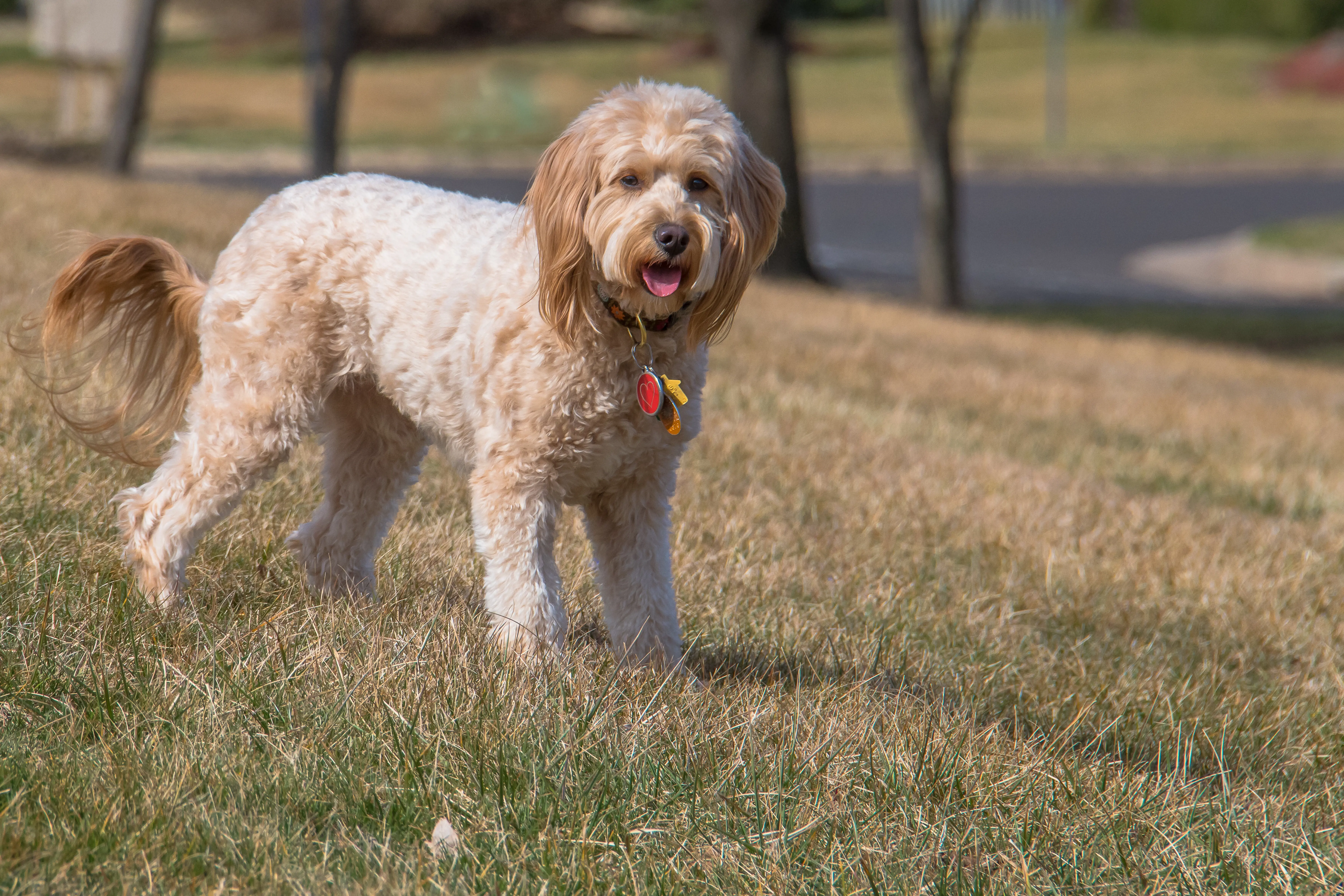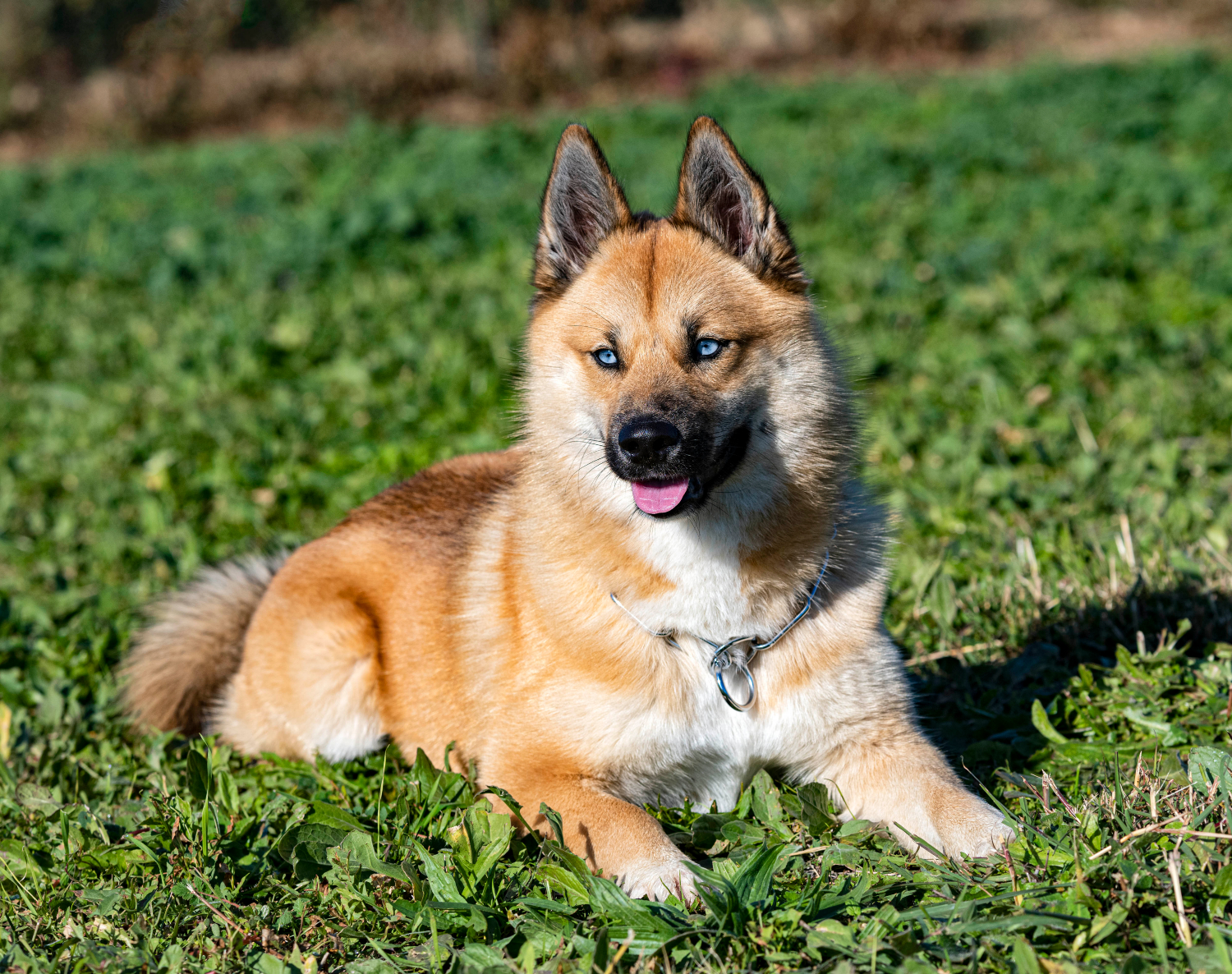Why are mixed breeds so popular now?
15th December, 2022

Is it a Pug? Is it a Jack Russell? No, it’s a Jug! We love mixed breeds here at Purely Pets but are they right for you? Let’s consider the pros and cons of owning a canine cross.
Looking for a hybrid hound? There’s no denying the popularity of mixed breed pups. And it’s easy to see why.
A pooch of this kind costs far less than a pedigree, and they often come with all the best bits from both parents.
Yes, they might look a little ‘different’ but that just makes them even more lovable, right? Just picture yourself settling in for a snuggle with your Schnoodle or Pomsky. Cuteness overload!
But are these wonderful mixed breeds right for you? We weigh up the pros and cons below. Remember, whatever breed you go for, you’ll still need to look for the right dog insurance plans to suit your needs. We can help you with that, too!
First up, what is a mixed breed dog?
What do we mean by mixed breeds? Are they mongrels? Well, sort of. Both these terms refer to a dog with parents from different breeds.
Now, mongrels sometimes come with a bit of a negative connotation (they shouldn’t do – they’re just as lovable), and will usually have two parents that were also mixed breeds, so we can’t tell much about their genetic makeup.
A mixed breed, on the other hand, has two purebred parents, like a Labrador and a Springer Spaniel. The result? A Springador!
This makes it a little easier to tell what to expect with your new pup as we already know the typical traits of both parents – although there’s no telling which ones it’ll inherit.
You might not be winning Crufts with your mixed breed – although they are allowed to enter the Scruffts competition – but that’s not really a problem for most pet parents who are just looking for a faithful friend.
Just remember, whatever canine concoction you bring home, you’ll need to cover them with pet insurance in case of an emergency. At Purely Pets, we have 15 levels of dog insurance plans to choose from, so call today for a quick quote.
What are the pros and cons of owning a cross breed pooch?
You’re roaming the dog shelters to find the perfect pup and you see the cutest puppy dog eyes staring back at you. That’s the one! That’s your new canine companion! But wait, what breed is it? Does it even matter?
As with any hybrid animal, whether it be a cockapoo, liger or zorse, there are some advantages to the mixed gene pool. But there are also a few disadvantages that every new pet owner needs to be aware of.
Below, we compare the pros and cons of mixed breed pups, so you can make the right decision for you.
Pros of mixed breeds
- They cost less – many mixed breeds come from shelters, where you usually only need to pay a small fee.
- They may have a lower risk of health issues – this isn’t a given as every dog is unique, but the fact they aren’t inbred can mean they’re less likely to develop genetic problems.
- They are unique – a Yorkie is a Yorkie, right? Yes, but when you mix it with a Maltese, it looks completely different and can resemble either parent!
- They make excellent pets – well, all dogs are wonderful in their own way, but mixed breeds tend to be easy to train and can adapt to many situations, thanks to their blend of genes.
- They’re getting a home – if you get your mixed pup from a rescue centre, you may well be saving its life! And that’s not all. You’ll be making space for more homeless hounds looking for their forever home. Do you need a better reason?
Cons of mixed breeds
- They can be unpredictable – although you know the two parents' breeds, you can’t tell which traits will be passed down to your pup.
- You can’t tell what they’ll look like – it’s impossible to predict the exact size and appearance when they’re still a puppy.
- They could experience difficulty during delivery – if you’ve got your heart set on a specific mixed breed but one of the parents is much bigger than the other, there’s the risk of the puppies being too large for the mother to deliver safely without a C-section.
When you come to a specialist like Purely Pets, you can cover your mixed breed for medical treatment up to £15,000. Check out all the benefits of our dog insurance plans today.
Top 10 mixed breeds you’ll want to own
You’ve decided a mixed breed is right for you. Great decision! While it can be exciting to let the dog world be your oyster and see which pup finds you, it’s also good to do your research on the mixed breeds out there.
So, without further ado, here are some of our favourite crosses.
1. Cockapoo
Affectionate, intelligent, and easy to train, this cocker spaniel and poodle mix is a family favourite. Their love for life rubs off on everyone they meet and it’ll be hard to find a pet who adores you more than these guys!
But why choose a cross instead of a poodle or cocker spaniel? Well, this beautiful blend combines the best traits of both parents – the sweet and stable personality of a cocker and the poodle’s intelligence and gentle nature.
Whether you’re a family with lots of kids or a retiring couple looking for a cuddly companion, this accepting pooch will fit right in.
Allergic to dogs? They’ve got that covered, too, thanks to their fluffy coat of hypoallergenic fur! Popular since the 1960s, we don’t see this breed falling in the ranks anytime soon.
2. Puggle
For active and noisy households, this Pug/Beagle cross will make the perfect companion. Yes, they might like to bark, but they’re raring to go from the moment they get up in the morning.
Full of energy and uber friendly, Puggles can be seen darting from one room to another indoors or digging a deep hole outside.
This breed is sociable and smart, but that doesn’t mean they’re always eager to please. You might find training a bit of a struggle unless you keep sessions short and provide plenty of positive reinforcement, which they’ll love you for, of course!
But not a lot beats getting home and being greeted by one of the most adorable faces in dog land.
3. Schnoodle
What do you get when you cross a Schnauzer with a poodle? You guessed it – a Schnoodle! If you’re looking for a pet to cuddle when it's cold outside but also one who gets you up off the sofa and moving, you can’t go wrong with this breed.
Loyal like a Schnauzer and playful like a poodle, there’s lots to love about these pups. They might be stubborn now and again and like their independence, but that doesn’t mean they don’t adore their owners more than life itself.
Not got lots of time to train your new pet? Schnoodles are smart and incredibly agile, able to pick up new tricks at the drop of a hat.
Yes, some really love barking (sorry neighbours). Yes, some will dig you a new pond in the backyard. But these pups make wonderful pets who love nothing more than a game of fetch or a thrilling ride in the car with their doting family.
Make sure any dog insurance plans cover treatment for emergency gastric twists as that's just one of the few health conditions this breed suffers from.
4. Boxador
Big garden? Want a big dog to go in it? This Boxer and Labrador blend could be your perfect match.
Smother your Boxador with oodles of love and attention and you can expect sloppy, wet kisses around the clock in return. Devoted to their families, this breed is intelligent and gets on well with kids and other pets.
Just don’t leave them alone for too long or their destructive nature might sneak to the surface. Boxadors may get bored quickly, so you’ll need to keep them amused.
Expect long walks in the country followed by a lazy afternoon in front of the TV with these easy-to-groom pets.
Even the potential allergy, bloat and hip problems don’t make us love them any less.
5. Pomsky

If ever a dog was to become a comedian, we bet it would be a Pomsky! This Pomeranian and Husky mix wants nothing more than to be the centre of attention, and it makes no secret that it knows the power of its cute antics.
Highly intelligent and very adaptable, this breed can live in most environments, as long as you take it for at least one walk a day.
Lint rollers and vacuums at the ready! Pomskies shed. A lot. They’re also rather ‘chatty’, which might upset your neighbours but good training should keep disturbances to a minimum.
Banish nervousness early on with good socialisation and they’ll soon want to play with everyone they meet.
6. Chiweenie
German Taco. Mexican Hot Dog. Weeniehuahua. There’s no shortage of nicknames for these compact pups! They’re as loyal as any Chihuahua and don’t come with the high risk of back issues that Dachshunds often suffer from. Bonus!
Sometimes described as ‘spunky’ or ‘firecrackers’, these dogs might be small but they definitely make themselves known. They might even fall into the yappy category!
Live by yourself? Looking for a devoted companion? A Chiweenie loves nothing better than one-on-one attention from their favourite human. It could be you!
7. Morkie
These little fluff balls will love you with every breath and their huge personality comes with energy levels to match. They might be small but they’re mighty.
This Maltese and Yorkshire Terrier mix does demand a lot of attention and might be better with smaller households – but that doesn’t mean they’re unfriendly.
The breed fits in better with families that have older children. Little ones can easily injure your delicate dog, so make sure you check out our dog insurance plans to cover your pup if playtime gets too rough.
Morkies come in all shades and don’t shed a lot – great news if you hate vacuuming!
8. Jackapoo
The Poodles have popped up again! Except this time they’re mixed with the friendly and on-the-go Jack Russell Terrier.
These pooches are ideal for adventurous families who’ve got lots of time to spend with their pup in the great outdoors. Their Jack Russell traits mean they love to dig, so getting them out and about means they make holes in the woods rather than your back garden!
They might be small, but their agile nature could mean their Olympian jumping skills see them soaring over small fences. Read these tips on how to make your garden escape-proof before they make a run for it!
As with all mixed breeds, regular health check-ups are a must. Routine visits like this aren’t included in dog insurance plans but are essential to keeping your pup in tip-top shape.
9. Chug
Always wanted a Pug but scared of the horror stories you’ve heard about their breathing difficulties? Enter the Chug!
This cute little cross between a Pug and a Chihuahua takes the best bits from both breeds and may cleverly reduce some of the respiratory risks found in the purebred versions.
If you’re looking for a tiny, tiny dog, this is it - although don’t be fooled by its miniature appearance. This is a pup with a big personality.
You might think this breed is perfect for kids but, in fact, its delicate stature means it needs careful handling. Probably best to avoid the rough and tumble of family life.
If you’re single, though, a Chug could well become your soul mate as they usually bond closely with just one special pet parent.
A Chug - or Pughuahua as it’s also known - will need less than an hour’s walk a day, so great if you have a busy schedule. But they also live for a decade or more on average, so even though it’s a small pup, it’s a big commitment.
10. Labradinger / Springador
Love your working dogs? Why not mix two of the best around? The Labradinger – or Springador – perfectly blends the English Springer Spaniel and the lovable Lab – and the results are simply stunning.
What can you expect? You’ll usually get the traditional black, yellow or chocolate colouring of the lab mixed with flashes of white and the odd curly hair of the springer. But, as with all mixed breeds, you can never truly predict how a pup will look in later life. But that’s all part of the fun!
Families who love getting out and about in nature will find the perfect pet partner in a Springador. On the flip side, if you’ve got a small garden and no time for walkies, this breed probably isn’t the one for you.
With a high prey drive, these dogs will also need consistent training and early socialisation to be the best versions of themselves in later life.
Specialist dog insurance plans will help you cover emergency treatment when these avid hunters get into any unexpected scrapes.
Health wise, there are also a few issues that this mixed breed might inherit from either parent, so they might not be the cheapest breed to insure.
Things to watch out for include:
- Hip dysplasia
- Progressive retinal atrophy
- Ear disorders
- Epilepsy
- Allergies
As a breed that sheds quite a lot, you may well be cleaning your house more often with a Labradringer – but a house just isn’t a home without a canine companion like this.
Do mixed breeds have fewer health problems?
There’s no definitive answer to this question, but studies have shown that purebred dogs are at a much higher risk of developing hereditary conditions, which means that mixed breeds may experience fewer health concerns.
Their lifespan is a little longer and they do seem a little ‘tougher’ than their thoroughbred counterparts, but in reality, every dog and their circumstances are unique.
It’s hard to tell whether your mixed pup has inherited any predisposed conditions from mum and dad until they surface, however much we wish we could.
One possible way would be to get a doggy DNA test. The Kennel Club offers these for purebred pups but there are many independent companies offering these online for crossbreeds, too.
As a pet parent, it’s your responsibility to look out for your furry family member by:
- Feeding them a high-nutrition, well-balanced, age-appropriate diet.
- Watching their weight.
- Providing regular mental and physical stimulation.
- Searching for dog insurance plans that cover emergency treatment.
- Taking them for routine check-ups, like vaccinations and flea treatments.
Tempted to skip the non-emergency vet check-ups because they aren’t covered by most dog insurance plans? This can be a false economy. Giving your pup an annual medical exam can identify nasty illnesses before they become bigger problems.
Speak with your vet about a pet health plan to help spread the costs of routine visits over a year. When you bring your mixed breed home, you should expect to budget for dog insurance plans as well as:
- Vaccinations
- Flea and worming treatments
- Microchip
- Neutering
Find dog insurance plans packed with benefits

As dog lovers ourselves, we understand the kinds of benefits you’re looking for in dog insurance plans.
- Easy online policy management? Tick!
- A 24/7 vet video consultation service? Tick!
- A choice of cover levels to suit your budget? We’ve got it all!
Give us a call to find out why so many pet owners trust our 5 star Defaqto-rated dog insurance plans today.
Helpful Pages
Recent Posts
Pet Insurance Quote
- 98% claims paid *
- Claims paid directly to vets
- 24/7 vet video consultations
- Interest free monthly payments




